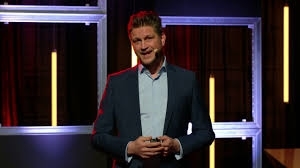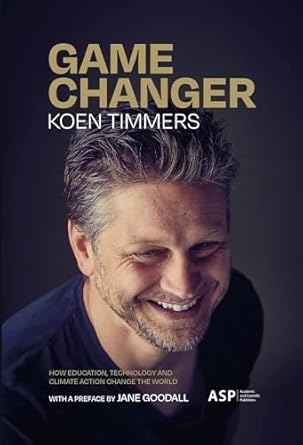Koen Timmers is a Belgian educator with over two decades of experience, specializing in technology-enhanced learning and global curriculum innovation. Holding degrees in teaching and in technology-enhanced learning, innovation, and change, he also founded Zelfstudie.be, Belgium’s largest educational website offering more than 60 digital courses to tens of thousands of users. Today, Timmers is building a global movement of young people and teachers to reform climate change curricula in schools worldwide. Through a non-alarmist, solution-oriented approach, he links local climate action with global empathy-building, empowering teachers to connect students across continents to share how climate change impacts them, co-create solutions, and integrate climate education into their local institutions.
 Koen Timmers
Koen Timmers
The topic of education has accompanied Koen throughout his life. Timmers grew up in a family of teachers; his mother and aunt were both teachers. Combining both his technical knowledge and his passion for pedagogy, Timmers created his own e-learning organization, Zelfstudie.com, in 2006, with a community of 20,000 paying members at its peak.
Timmers' interest in leveraging technology to diffuse knowledge continued and led him to do a master’s degree in technology-enhanced learning. Through this master's program, Timmers became involved with the Microsoft Education Network, an initiative launched to give recognition to teachers who use innovative tools to provide education. It was here that Timmers realized how this international community of teachers could be leveraged to have an impact.
Inspired by a connection with the Kakuma refugee camp in Kenya, Timmers began teaching refugee students via Skype. He shipped laptops, solar power kits, and internet infrastructure, building a global network of over 250 educators across 55 countries who deliver free lessons to refugees. The Kakuma Project was recognized in a documentary, Heroes for the Planet by Kief Davidson, and featured in the WEF’s Schools of the Future report
Thanks to this first improvised mobilization of the network, Timmers realized the power of the teacher network he had created and realized that he could leverage it to have a more global impact. He subsequently launched the Human Differences project, which included 51 schools from 37 countries, the Wai Water Project involving ten schools from 9 countries, and the Innovation Project involving 515 schools from 85 countries between 2015 and 2017. Having tested his model several times, Timmers decided in September 2017 that climate change education was the topic where he could have the most impact and started building the Climate Action Project. Timmers self-funded the Climate Action Project in its early years while continuing his work as a teacher, until securing major funding in 2021. Today, he leads the initiative alongside U.S.-based educator Dr. Jennifer Williams, now executive director of Take Action Global, supported by three contractors and a team of dedicated volunteers.
Climate Action Project / Take Action Global (TAG)
Empowering 1 billion students to take action for a cleaner environment by 2030
High-quality climate change education is still a rarity in most of the world’s schools, even as climate impacts disrupt the lives of billions. For many educators, the topic remains difficult to bring into the classroom. Some lack the practical tools to make it engaging and understandable, while others struggle to help students relate their personal actions to environmental consequences.
Through his initiative, the Climate Action Project, now incorporated as Take Action Global (TAG) which launched in 2017, Timmers saw a way to bridge that gap. Drawing on his global network of teachers, he recognized that pairing local climate awareness with opportunities to exchange experiences across borders could help young people better understand the personal and societal dimensions of this complex issue. In response, he launched an educational movement that uses technology to create action-oriented, worldwide learning experiences, bringing together students and teachers to learn, share, and design solutions to climate change.
Each year, for six weeks, classrooms from around the world join a virtual learning program that blends collaborative projects, hands-on activities, playful learning, expert talks, and carbon-tracking tools. The curriculum is available in 14 languages, making it accessible to students aged 6 to 22. During the program, partner schools from different regions visit each other virtually, enabling students to see how climate change is impacting peers in vastly different environments. At the end of the six weeks, every student presents a concrete environmental action for their local area, with the projects streamed globally, allowing others to learn from and be inspired by emerging local solutions.
The six-week program serves as both a classroom experience and a catalyst for empowering teachers to become climate education ambassadors. Equipped with resources and connections, these teacher-leaders work with unions and ministries to advocate for systemic change, including the integration of climate education into national curricula. In countries like Peru and the Philippines, local ambassadors have even influenced negotiations that led to the Climate Action Project’s curriculum being considered at the policy level.
To date, more than 3.4 million students and 21,000 teachers have participated in the initiative. Many projects have continued well beyond the classroom. In Ireland, for example, a group of students successfully campaigned to change the country’s recycling symbol, which previously resembled an organic food label and often caused recyclables to be thrown into the wrong bin.
Supported by leading environmental and humanitarian figures, the sessions culminate in annual Climate Action Day events featuring prominent global voices. TAG has worked with WWF, NASA, UN, the Jane Goodall Institute and many more worldwide organizations. See more: www.takeactionglobal.org.
Timmers has also led projects on human differences, water scarcity, and innovation, engaging schools worldwide on sustainability. He has been instrumental in establishing “Innovation Lab Schools” in several African countries. Timmers has many accolades including Global Teacher Prize: Top 20 finalist in 2017 and Top 10 in 2018, Fellow of the Royal Society of Arts (FRSA) since 2019, Ashoka Fellow for his work in climate-focused education, and an Honorary Doctorate from Sheffield Hallam University. He is also the author of Game Changer, a book detailing his journey and projects and a TEDx speaker on transformative education.
 Game Changer
Game Changer
Page created on 8/12/2025 2:36:26 PM
Last edited 8/12/2025 3:31:43 PM
